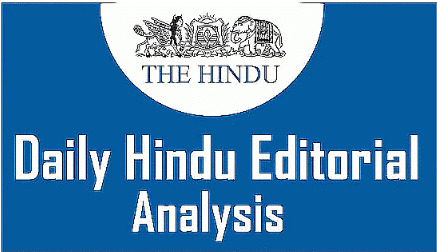The Hindu Editorial Analysis- 21st April 2025 | Current Affairs & Hindu Analysis: Daily, Weekly & Monthly - UPSC PDF Download

Calling out American trade illegality
Why in News?
India’s muted response is striking, especially when it should be leading the Global South and pushing for a fair and just trading system
- The world is shocked by the U.S. decision on April 2, 2025, to impose reciprocal tariffs, which are paused for 90 days except on China. These tariffs go against WTO rules, but President Trump seems to ignore global trade laws. Since the announcement, some countries have criticised the U.S., while others have stayed silent.
Criticising the U.S.

Reasons Behind India’s Silence on U.S. Tariffs
India’s lack of public criticism regarding U.S. tariffs is often explained by two main arguments. However, both reasons merit deeper scrutiny.
Ongoing Bilateral Trade Negotiations with the U.S.
Argument Presented: India is in the process of negotiating a Bilateral Trade Agreement (BTA) with the U.S., and it is believed that publicly criticizing the U.S. for its tariff actions could jeopardize these talks. Critique of the Argument: This reasoning appears inconsistent and one-sided.
- The U.S., despite being in negotiations with India, has openly criticized India's high but legal tariffs.
- Former President Donald Trump publicly voiced dissatisfaction with India’s tariff regime multiple times.
- These criticisms did not halt trade discussions or deter cooperation.
Global Context: Other countries that are also engaged in bilateral negotiations with the U.S. have not hesitated to condemn U.S. unilateral actions. Raising concerns about violations of WTO rules does not amount to hostile retaliation, especially in the absence of reciprocal tariffs.
India’s Position: Even if India communicates its concerns privately, a public stance would reaffirm its commitment to a rule-based international trade system. Highlighting the need for adherence to global trade norms is not confrontational but constructive.
Dysfunctionality of the WTO Dispute Settlement Mechanism
Argument Presented: With the WTO’s dispute resolution body currently ineffective, filing a legal case or calling out the U.S. seems futile. Critique of the Argument: This view reduces the value of international law to mere enforcement and material outcomes. Legal systems also serve to distinguish legitimate authority from raw power, even when enforcement is delayed or absent.
- Importance of Legal Symbolism: International law enables actors to question and delegitimize actions by more powerful states. Filing a case, even if symbolic, can reinforce the principle of legality and norms.
- Examples from Other Nations: Countries like China and Canada, despite knowing the WTO mechanism’s limitations, have filed legal claims against the U.S. Their actions reflect an understanding that invoking international law bolsters their legitimacy on the global stage.
Conclusion: Respect for trade rules
Recently, about 40 WTO member countries, including many developing nations, supported trade multilateralism and WTO rules in response to U.S. tariffs.
wever, India, despite backing rule-based trade, did not sign the statement. This is a key moment for India to lead the Global South, promote fair trade, and oppose unilateral actions. History should see India as a defender of its interests and a champion of a just trading system.
|
44 videos|5271 docs|1113 tests
|
FAQs on The Hindu Editorial Analysis- 21st April 2025 - Current Affairs & Hindu Analysis: Daily, Weekly & Monthly - UPSC
| 1. What are some common forms of trade illegality in the United States? |  |
| 2. How does illegal trade impact the American economy? |  |
| 3. What measures are being taken by the U.S. government to combat trade illegality? |  |
| 4. How can businesses ensure compliance with trade regulations to avoid illegality? |  |
| 5. What role do international agreements play in addressing trade illegality? |  |
















